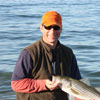The Overfishing Dilemma
By Tom Keer
Oct 19, 2016
We all like to catch and eat fish. Finding a balance between commercial and recreational fishing is the key.
We go fishing to catch fish, and when we hook up we like to keep some to eat. But in some areas of the country we can't seem to find fish, and that is frequently due to overfishing.
But exactly what is overfishing? Overfishing is catching too many fish at once so that the breeding population becomes too depleted to recover. Water quality can be an issue true, but the leading reason usually involves the complex realm of fisheries management. Around the world, many fisheries are governed by rules that make the problem worse. Some have no rules at all.
We're part of the problem, too, for we eat twice as much fish as people did 50 years ago! That demand results in 30 percent of fisheries worldwide being pushed too far. In my Northeast Atlantic home waters for instance, 39% of species are overfished.
Here are four management issues that make finding a balance difficult and challenging.
1. Bottom trawling catches fish but it destroys the ocean's bottom. Heavy nets weighing several tons each tear up the bottom and displace coral, sponges and other sensitive seafloor life.
2. Bycatch fishing problems. Bycatch is a fishing industry term for when fish species are caught by accident while fishing for other target fish. The problem with targeting a species with trawlers or draggers is that they frequently grab other species that are essential to the food chain. By the time the haul is sorted a lot of the by catch dies and thereby alters the normal food chain. Turtles, dolphin, birds, sharks and even other fish are harmed.
3. Apex predators. In the past 50 years, 90% of the oceans top predators like sharks, bluefin tuna, swordfish, marlin and king mackerel have been harvested. That is not the problem, but the issue comes when there is too large a population of smaller, plankton-eating fish that throws the remaining balance out of order.
4. Overfishing has occurred for hundreds of years. There were the select-whale harvests in the 1800's for blubber for lamp oil, and those in the mid-1900's for Atlantic cod and herring. At one point, California sardines were nearly harvested to extinction.
Finding an overfishing solution is vital. We can help through catch-and-release and by limiting the number of fish we harvest. Getting involved with conservation groups and research programs is another great way to help.
But exactly what is overfishing? Overfishing is catching too many fish at once so that the breeding population becomes too depleted to recover. Water quality can be an issue true, but the leading reason usually involves the complex realm of fisheries management. Around the world, many fisheries are governed by rules that make the problem worse. Some have no rules at all.
We're part of the problem, too, for we eat twice as much fish as people did 50 years ago! That demand results in 30 percent of fisheries worldwide being pushed too far. In my Northeast Atlantic home waters for instance, 39% of species are overfished.
Here are four management issues that make finding a balance difficult and challenging.
1. Bottom trawling catches fish but it destroys the ocean's bottom. Heavy nets weighing several tons each tear up the bottom and displace coral, sponges and other sensitive seafloor life.
2. Bycatch fishing problems. Bycatch is a fishing industry term for when fish species are caught by accident while fishing for other target fish. The problem with targeting a species with trawlers or draggers is that they frequently grab other species that are essential to the food chain. By the time the haul is sorted a lot of the by catch dies and thereby alters the normal food chain. Turtles, dolphin, birds, sharks and even other fish are harmed.
3. Apex predators. In the past 50 years, 90% of the oceans top predators like sharks, bluefin tuna, swordfish, marlin and king mackerel have been harvested. That is not the problem, but the issue comes when there is too large a population of smaller, plankton-eating fish that throws the remaining balance out of order.
4. Overfishing has occurred for hundreds of years. There were the select-whale harvests in the 1800's for blubber for lamp oil, and those in the mid-1900's for Atlantic cod and herring. At one point, California sardines were nearly harvested to extinction.
Finding an overfishing solution is vital. We can help through catch-and-release and by limiting the number of fish we harvest. Getting involved with conservation groups and research programs is another great way to help.
Popular Posts









